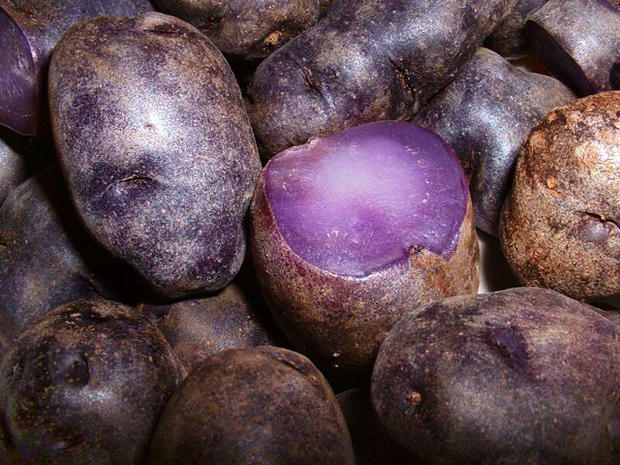Spud study shows potatoes lower blood pressure
(CBS) Spuds are good for the blood - blood pressure, that is. At least that's the suggestion of a small study that showed that two servings of potatoes a day can lower high blood pressure.
For the study, 18 mostly obese people with high blood pressure ate six to eight purple potatoes and their skins twice daily for one month. By the end of the study period, the average diastolic blood pressure reading (the lower number) had fallen 4.3 percent on average, while the systolic pressure (upper number) had fallen an average of 3.5 percent.
Blood pressure fell even in people who were already taking antihypertensive medication.
All those spuds must have really packed on the pounds, right? Actually no. Not one of the study participants gained weight.
"The potato, more than perhaps any other vegetable, has an undeserved bad reputation that has led many health-conscious people to ban them from their diet," study author Dr. Joe Vinson, a professor of chemistry at the University of Scranton in Pennsylvania, said in a written statement. "Mention 'potato' and people think 'fattening, high-carbs, empty calories.' In reality, when prepared without frying and served without butter, margarine or sour cream, one potato has only 110 calories and dozens of healthful phytochemicals and vitamins."
The golf-ball-sized potatoes used in the study are widely available in supermarkets, according to Vinson. But he thinks future research involving white potatoes will yield similar results.
What explains the potato's apparent pressure-lowering power? Put it down to phytochemicals, the plant-based compounds that have been tied to a variety of health benefits. Previous research has shown that potatoes contain substances similar to ACE inhibitors, a widely used family of blood pressure drugs, along with other potentially beneficial phytochemicals, according to the statement.
"The skin is the key," Londa Sandon, an assistant professor of nutrition at the University of Texas Southwestern Medical Center in Dallas, told USA Today. "That's where the nutrients are."
Dr. Vinson reported his findings of his study - which was funded by the U.S. Department of Agriculture - at the annual meeting of the American Chemical Society, held August 28 through September 1 in Denver.
The American Academy of Family Physicians has more on high blood pressure.
